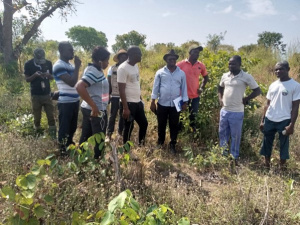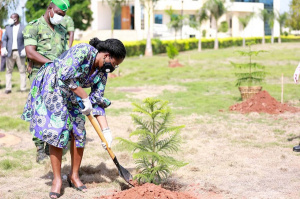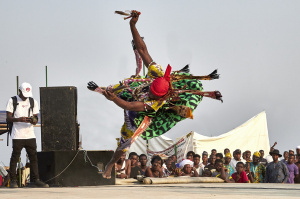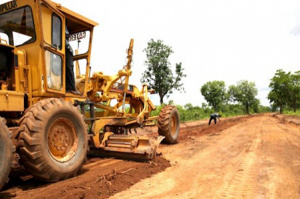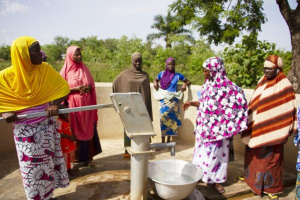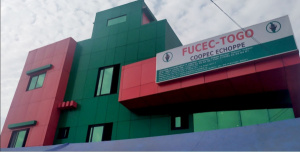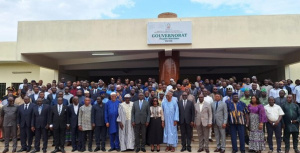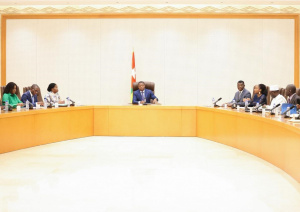Togo First
Togo: Rice Imports Exceeded CFA43 Billion in 2023
Togo imported over CFA43 billion worth of rice in 2023. The figure was disclosed by Djélé Dahouda, National Coordinator of the Food System Resilience Program in West Africa (FSRP), during an event held last month. Organized by the national institute of statistics, the INSEED, the event focused on mapping the rice industry in Togo.
Value-wise, rice imports in 2023 were 150% higher than in 2019. That year, they stood at CFA16.7 billion.
According to Djélé Dahouda, the surge reflects the country’s heavy reliance on imported rice to meet its needs. “This situation calls for urgent action to overcome the constraints and achieve self-sufficiency in rice,” he noted while stressing that national production covered only 32% of domestic demand in 2023.
Togo imports most of its rice from Thaïland. According to data from Thaï exporters reported by the Ecofin Agency, the West African country bought 52,568 tonnes from Thaïland in 2023.
That year, Togo was Thaïland’s 10 biggest importer, worldwide. However, Togo imported less rice from the Asian country than its neighbor, Benin (139,206 tonnes), or other African countries like Zimbabwe (55,691 tonnes), Algeria (76,747 tonnes), or Angola (135,909 tonnes).
In 2020, Togo adopted an updated version of its National Rice Development Strategy (SNDR 2), to curb dependency on rice imports. Featuring several projects, the strategy aims to boost Togo’s output to 1,115,087 tonnes by 2030, from 145,489 tonnes in 2019.
This article was initially published in French by Esaïe Edoh
Edited in English by Ola Schad Akinocho
Togo: Agricultural Processing Agency Togo is Hiring 55 New Agents
The Agricultural Processing Agency of Togo (ATA) is hiring. They recently launched a campaign to recruit 55 new agents, including managers, technicians, engineers, and drivers.
Interested candidates can apply until February 9, 2025. The ATA noted that civil servants can apply, provided they first have the approval of the Ministry of Civil Service for a possible transfer to the agency if selected.
The ATA has supported over 6,000 farmers in its first two years, implementing pilot programs in 60 cantons. This initiative has helped boost agricultural productivity and improve the incomes of producers' cooperatives.
The new agents will help the agency achieve its various goals, particularly expanding the program to reach 10,000 producers nationwide by 2025 and 100,000 by 2030. The newly hired staff should start work on April 1.
Togo: 9.14 Million Seedlings Planted in 2024
9.14 million trees were planted in 2024 as part of the country's reforestation efforts. The figure was disclosed during the Council of Ministers held on January 10. These trees cover an area of 11,544 hectares and are part of a plan to increase forest cover to 25% of the country by 2030.
The government has introduced incentives to bolster the reforestation efforts, including prizes for the best planters in each region. President Faure Essozimna Gnassingbé asked the government to create a map showing reforested areas. This map will help inform people and encourage them to get involved in reforestation. The goal is to improve transparency and promote shared responsibility for these efforts.
While these numbers show improvement compared to previous years, they are still far from the ambitious goal of planting 1 billion trees by 2030, which the government set in 2020. The challenge is significant since only a few million trees have been planted in past years.
However, this 10-year goal has created momentum for reforestation. For example, by 2022, Togo had planted over 5 million trees across more than 8,000 hectares, marking a 57% increase from 2021.
Ayi Renaud Dossavi
Togo: 10th Edition of Black Divinities Festival Held in Glidji and Aného
The towns of Aného (45 km East of Lomé) and Glidji are hosting the tenth edition of the Festival des Divinités Noires (Black Divinities Festival) until January 19, 2025. This festival celebrates Africa's rich and diverse cultural heritage.
This year, the festival is dedicated to Brazil and includes various activities. Highlights include the Fâ mass, a divinatory art practiced in Togo, Nigeria, and Benin.
There will also be parades from African and Afro-Brazilian initiation societies, conferences, concerts, and workshops on Samba (a Brazilian dance) and Maracatu (a Brazilian carnival procession).
The festival pays tribute to the late Nei Futuro Bitencourt, a former Brazilian ambassador to Togo, for his role in organizing the event.
Vincent Harisdo, a member of the organizing committee, said this edition aims to strengthen the historical and spiritual ties between Africa and the Americas while giving young people a chance to connect with their culture.
The Festival des Divinités Noires was created in 2006 and is organized by the Acofin Association.
This article was initially published in French by Ayi Renaud Dossavi
Edited in English by Ola Schad Akinocho
Togo Allocates CFA32 Billion for Rural Road Development
This year, the Togolese government has set aside a CFA32 billion budget to develop rural roads across the country. The Ministry of Public Works will use the funds to continue projects to improve infrastructure in rural areas.
Last year, CFA53 billion was set aside to develop rural roads–39% more than this year. One of the ongoing projects includes the construction of 21 key points. This project was 45% complete by the end of 2024. The program to build and repair rural roads aims to cover 4,550 kilometers by 2025 and has shown good progress. In his address to the nation on 31 December 2024, President Faure Gnassingbé said “More than 1,900 kilometers of roads have been opened or repaired each year since 2020.”
The government plans to finish ongoing projects this year. The main goal is to help people in rural parts of the country readily access basic services and sell agricultural products more easily.
Esaïe Edoh
Togo Allocates CFA19 Billion to Water Supply Projects in 2025
The Togolese government will spend CFA19 billion on water supply projects this year. This is 5% more than last year and 86% of the budget set for the Ministry of Water in 2025.
The CFA19 billion will finance various projects falling under Togo’s clean water supply strategy, launched in February 2021.
One key initiative is the PASSCO3, which aims to improve sanitary conditions in rural areas and schools in the Kara and Savanes regions. As part of this initiative, 850 boreholes with human-powered pumps will be set up, providing drinking water to over 200,000 people in rural areas by the end of 2025.
Additionally, Togo will enhance the water supply in Lomé by equipping a 40-cubic-meter-per-hour borehole in Apédokoe, in the South- West of Grand Lomé, and constructing a new 1,300-cubic-meter water tower in Sagbado, in Commune 7 in the South West of Grand-Lomé.
The Togo Urban Water Security Project (PaSH-MUT), launched in October 2023, also supports this effort. It aims to install six autonomous drinking water systems in Lomé’s outskirts to address urban demand.
Togo seeks to provide clean water to 85% of the population by the end of this year, and 100% by 2030. According to the Ministry of Water and Village Hydraulics, drinking water coverage increased from 47.66% in 2014 to 69% in 2023.
This article was initially published in French by Esaïe Edoh
Edited in English by Ola Schad Akinocho
Togo Recognizes Over 70 Microfinance Institutions
In Togo, 72 decentralized financial systems (DFS) are now officially recognized. These include credit unions and savings banks, the Ministry of Economy and Finance reported on January 9.
These institutions include credit unions, mutual funds, and savings banks. Among them are six major microfinance networks, which regroup 85 basic credit unions.
The largest and oldest network is the Faîtière des Unités Coopératives d'Épargne et de Crédit du Togo (FUCEC-Togo), which includes 43 basic credit unions.
These institutions play an important role in financing economic activities. They provide loans to businesses in various sectors, helping to boost the national economy.
By the end of H1 2024, loans from SFDs reached nearly CFA400 billion, up 13% year-on-year. At the same time, membership grew by 8% to 4.2 million. This shows how important decentralized financial systems are becoming in Togo and their ability to meet the needs of the Togolese people.
Esaïe Edoh
Decentralization: Togo Sets Aside CFA32 Billion Under 2025 Budget
Togo will spend CFA32 billion on its decentralization and deconcentration efforts this year. This is 91% of the Ministry of Decentralization’s total budget of CFA35 billion. The funds will help support local governments and establish regional councils and governors.
The Ministry will primarily provide technical and administrative support to these local entities as powers are gradually transferred to them. This aims to help local authorities better meet the needs of their communities.
Togo has been strengthening local structures since 2019 by creating 117 communes. This year, these communes will hold elections to renew their municipal councils. Regional councils will also start their work in January and play an important role in local governance. These new bodies are meant to increase the independence of local authorities in managing public affairs.
Governors, whose appointments were mostly completed in 2024 except for the Central Region, will ensure that public policies are applied consistently, at the local level.
To decentralize further, the government plans to allocate CFA10 billion to communes through the Territorial Authorities Support Fund (FACT) in the fiscal year 2025.
Esaïe Edoh
Togo: CFA624.8 billion for the Ministry of the Armed Forces since 2020
Since adopting the military programming law in December 2020, Togo has allocated CFA624.8 billion to its armed forces. According to the Ministry of Territorial Administration, the sum amounts to 86.5% of the CFA722.3 billion forecast for the five years covered by the military program.
The funds should bolster Togo’s armed forces amidst increasing security challenges, with Operation Koundjoaré being a key focus.
The Ministry is also working to address staffing shortages, achieving an implementation rate of 89%. More military staff will be recruited this year, as noted in a report presented to the National Assembly.
Some budget adjustments have been necessary. For instance, in 2024, funding for operational capabilities was reduced from CFA28 billion to CFA12 billion. However, this decrease will be partially offset by a new program worth CFA173 billion planned for 2027. The government is discussing financing solutions with the Ministry of Economy and Finance to enhance logistical support and acquire necessary equipment.
These adjustments are crucial as security and stability remain top priorities for Togo, especially in the northern region near the Sahel, which faces threats from terrorism.
Esaïe Edoh
Nuclear: Togo Launches Atomic Energy Commission
Togo now has a nuclear energy-focused commission, the Atomic Energy Commission (CEAT). The news was disclosed during the January 10 Council of Ministers.
The CEAT’s creation shows Togo's commitment to using nuclear technology safely and effectively. With the commission, the authorities plan to improve local skills and fill technical gaps in managing nuclear resources. Lomé also wants to maximize nuclear’s impact in key sectors like energy, health, and agriculture, and to better fight climate change.
“The creation of the Atomic Energy Commission will enable our country to develop and implement training, research, and application programs concerning the development of nuclear technologies,” the government stated.
The CEAT will coordinate national efforts and create training and research programs. This complements the 2020 Nuclear Law and the National Nuclear Safety and Security Authority (ANSSN).
This announcement comes after Togo signed an agreement on December 2 with the American company Nano Nuclear Energy to produce electricity from small nuclear reactors. This agreement hinted at the creation of CEAT.
Togo joined the International Atomic Energy Agency (IAEA) in 2012.
Ayi Renaud Dossavi


